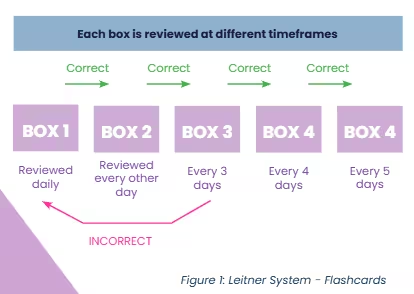It’s frustrating to spend time on revision that doesn’t work. Its understandable to lose motivation. And as you get further through the calendar year and closer to exams, the pressure and the procrastination guilt builds, and it gets even harder to see where to start.
What’s the big secret to why revision doesn’t work?
Here’s the secret – it isn’t your fault. Let’s come at it from a different angle.
Do you ever feel like there’s a secret trick that everyone is keeping to themselves, that makes life easier?
The secret that they are keeping to themselves is that they do things wrong way more often than they do things right.
Even the simplest of daily tasks, like brushing your teeth, had to be learned and went wrong a lot before it went right. Just ask your parents!
There’s absolutely no reason for revision to be any different to that, and so the trick is to expect it to go wrong a lot, before it starts to go right.
So what doesn’t work in revision?
Don’t be disheartened – we can speed up the process a bit by sharing best practices. Just like your parents supported you to learn how to brush your teeth well, you can be supported to learn how to revise well.
So if there’s a right way, then there’s a wrong way.
Unfortunately that means less of the ‘fun’ polished notes, pastel highlighters, washi tape process of revision, and more of the thinking and doing.
What really matters when revising is building clear, retrievable memories that match your learning goals.

So if you’re learning about Pythagoras’ Theorem, you are aiming to understand what it is, when it is applied, and how to apply it. And that understanding needs to find a secure spot in your brain where you will be able to find it again.
The ability to find it again is based on how often the path to its door is walked. Which practically speaking means how often we are using that information. Which is, I’m afraid, the reason for repetitive homework.
But that homework is much more effective when it isn’t all done at once. Spaced retrieval of that information – reviewing it daily for a few minutes – is much more effective.
How do we put that into practice?
Making your notes to revise from is the least effective and yet often most time consuming part of the process. The good news is that you can shrink the time needed with ready made notes, like the ones we provide in our online drive for students.
You can purchase great notes from CGP Books, or from online libraries like Save My Exams. That means you have all of the information to hand in a clear format, and your task is to get your brain working with it to keep hold of it.
For example, having a pile of flashcards can be part of a daily retrieval practice for information (that you already understand but need to recall).

Using the Leitner system, with stacks of flashcards, is something that you can build into existing daily routines with very little effort. But it will make a big impact on your progress towards your learning goals.
What are the key requirements for revision to work?
There is lots of brain science around how to make learning more impactful. I’m happy to have a chat about it if you’re interested, but that’s probably not what you came here for. You already have enough to learn!
So let’s focus on specific actions you can take that will make your task easier.
Your learning, whatever you are learning, follows a few key steps:
- Understand the content
- Apply the content with support (e.g. textbook, tutor, teacher)
- Remember the content
- Apply the content independently (from memory, with understanding)
- Build on the content with new learning.
This is the way that school curricula are built. There are essentially the same topics each year from reception to A level, but the content each year builds on the content from the previous year.
Lots of learning activities don’t complete this journey. You can read and understand something, but if you don’t remember it well enough to apply it to exam questions, you haven’t really learned it.
Ultimately academic learning is demonstrated with exam performance (unfortunately), so we have to bear that in mind when we are making study choices.
So to work towards learning, we have to actively follow the steps.
What might this look like in practice?
Let’s say you’re aiming to learn about photosynthesis. You first need to understand the process of photosynthesis.
To understand, I would watch a video on photosynthesis. I would also read some notes on photosynthesis.
While all of that information is fresh in my mind, I would think of a way to document the key information on a single page. In order to do that, I have to understand it and organise it. That is the first step in organising the memories in my brain, making it easier to recall them later.
Having done this, I would apply the content with some exam questions on photosynthesis. This is the best way to apply our learning as it mimics the assessment we are preparing for at school. But there’s all sorts of ways you can apply the content, and show how well you remember it.
In doing this, I would identify how often I can answer from memory and how often I need to reference my notes. That shows me what I am remembering and what I am not.
I can repeat this process, or else I can try different things like flashcards, quizzes, or anything else that requires me to recall and apply the content.
If you’re still feeling stuck, we can work on this together with a revision workshop. It will help you to break the mountain-sized task down into manageable steps, with specific, simple actions you can follow.
I’d love to have a chat about this with you. Send me a message at Georgina@GreenTutors.co.uk with any challenges you’re facing in revision.

Recent Comments